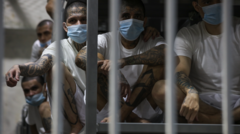In a bid to broker a humanitarian agreement, El Salvador's President Nayib Bukele proposed repatriating 252 Venezuelans deported by the US if Venezuela reciprocates by releasing the same number of its political prisoners. The proposal has emerged amid complicated immigration policies and controversies in both nations.
El Salvador Proposes Prisoner Swap with Venezuela Amid Immigration Controversies

El Salvador Proposes Prisoner Swap with Venezuela Amid Immigration Controversies
President Bukele suggests a deal for the repatriation of Venezuelan deportees in exchange for the release of political prisoners held in Venezuela.
El Salvador's President Nayib Bukele has put forward a proposal for a prisoner swap with Venezuela, offering to repatriate 252 Venezuelans deported by the United States in exchange for the release of the same number of political prisoners held by President Nicolás Maduro's government. In a post on social media, Bukele directly addressed Maduro, framing the proposal as a humanitarian initiative.
Bukele's communications suggest that many of the Venezuelans deported are linked to serious crimes, including "rape and murder," while he contends that those labeled as political prisoners in Venezuela are imprisoned solely for opposing Maduro, whose controversial re-election has faced widespread criticism.
Venezuela's government, however, maintains that it does not recognize the existence of political prisoners, a stance that has been widely rejected by human rights organizations. Bukele’s post read, "I want to propose you [Maduro] a humanitarian agreement calling for the repatriation of 100% of the 252 Venezuelans who were deported, in exchange for the release... of the identical number from among the thousands of political prisoners that you hold." He also highlighted that the deal could include nearly 50 prisoners from other nationalities, including American citizens.
The backdrop to this proposal includes a recent surge in deportations, with over 200 Venezuelans being sent back to El Salvador from the US. Many of these individuals are accused of affiliations with the Tren de Aragua criminal organization, and the US government compensates El Salvador for housing these individuals in its infamous Terrorism Confinement Center.
Amid the escalating debate over US immigration policies, recent court rulings have posed challenges to the mass deportation strategy adopted during President Donald Trump's administration. The US Supreme Court recently instructed a pause on the deportation of another group of Venezuelan gang members, in light of multiple legal challenges that have been branded by the White House as "meritless litigation." This case marks a significant moment in the use of the 1798 Alien Enemies Act, a law that permits the president to detain and deport individuals from 'enemy' nations without the usual legal procedures, a measure historically applied during wartime.


















